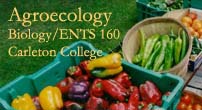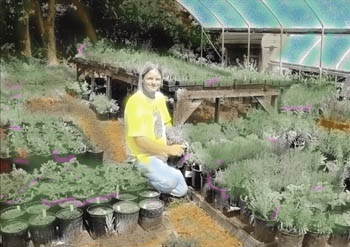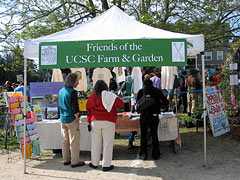
Farmelton
The Carleton Farm
A project of the Bio 160 Agroecology Course

College Name
University of California at Santa Cruz Center for Agroecology and Sustainable Food Systems
Brief Description of College
UCSC is a public university in the University of California system with an enrollment of 15,000 students, including around 1,000 graduate students. The undergraduate educational focus is predominately on liberal arts. It also has an engineering school, and two important research centers: the Institute of Marine Sciences and Santa Cruz Institute for Particle Physics.
Farm Size
Two acre garden and 25 acre farm
Produce of Farm
The farm grows a wide variety of vegetable, fruits, herbs and flowers.
Farming Approach
Everything is organic and as sustainable as possible. The farm has hand-dug garden beds, tractor-tilled row crop fields, research fields, orchards, and greenhouses.
Where Produce Goes
The produce is distributed in several ways: UCSC dining halls, organized by the UCSC Food Systems Working Group, comprised of students, staff, faculty members and community members, restaurants, Community Supported Agriculture, and farmers’ markets.
How Farm is Funded
Some funding comes from the Office of the President, but research and education funding is self-generated, from grants, donations, apprenticeship tuition fees, and produce sales.
How Farm is Staffed and Supervised
The center has an appointed director, who is also a faculty member. The farm has an extensive professional staff, a number of apprentices, and many affiliated faculty members.
Purposes of Farm
“The mission of the Center for Agroecology & Sustainable Food Systems (the Center) is to research, develop, and advance sustainable food and agricultural systems that are environmentally sound, economically viable, socially responsible, nonexploitative, and that serve as a foundation for future generations.” The farm is used for educational purposes by faculty, staff and students from a variety of disciplines. The Center for Agroecology and Sustainable Food Systems also works with non-governmental organizations, growers, governmental agencies like the USDA and US Cooperative Extension, and other community members.
How Farm was Initiated
Back in 1967, a gardener was hired to create a student garden, which was very successful, and eventually led to the current Apprenticeship in Ecological Horticulture training program. In 1974 the land for the farm was set aside by the college. The Agroecology program was started in 1980 when leading agroecology expert Stephen Gliessman was hired. In 1993, the Agroecology program expanded to become The Center for Agroecology and Sustainable Food Systems.

